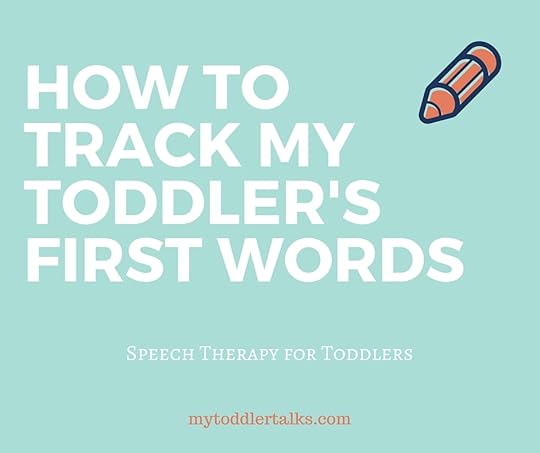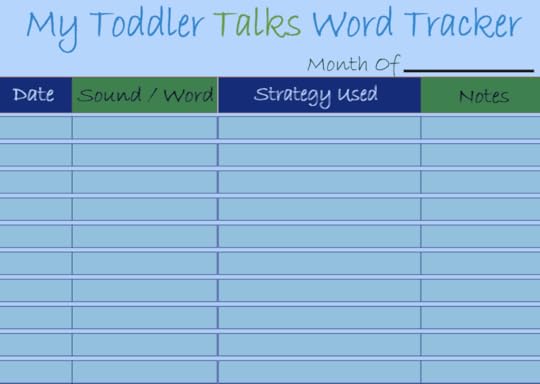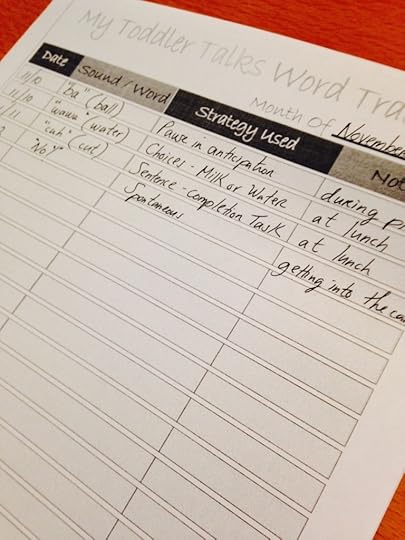Speech Therapy: How to Track My Toddler’s First Words
Speech Therapy: How to Track My Toddler’s First Words
Are you the lucky parent of a delightful toddler?
Or, the fortunate speech language pathologist or professional who works with charming, adorable toddlers?
If so, I bet you’ve heard or asked this question a bunch:
“How many words does your child say?”
Maybe you’ve heard it at your pediatrician’s office.
Maybe you’ve heard it from friends or even complete strangers (e.g. the nice cashier at the grocery store or a mom at the playground).
Or, maybe you’ve read announcements on your Facebook feed from proud parents revealing that their brilliant child who is only 15 months old has 50 words and speaks in full sentences. Maybe you even unfollowed your dear friend after reading it? I kid, I kid. Of course you wouldn’t do that, right?
I often encourage my clients to track their child’s first words.
Why Should I Track My Toddler’s First Words?
Tracking toddler’s first words tells us a few things.
1. Quantity – It tells us how many words are in a child’s expressive vocabulary.
By this I mean, the words that he or she can say independently, spontaneously – all by him or herself. For instance, Willie says milk every time he wants milk and doesn’t need to be prompted to say it.
Please know – just because your child doesn’t or can’t say a word doesn’t mean he doesn’t understand it. In other words, your child’s ability to understand words (receptive language) usually exceeds his or her ability to say a variety of words (expressive language). For instance, I still fumble over the word “Worcestershire” and avoid saying it whenever possible. But, boy oh boy, I certainly know what it is because I like Worcestershire sauce on my broiled salmon. Toddlers are similar. Some avoid saying words because they are hard to articulate OR because they’re not entirely sure or confident when or how to use the word (this is why you need to repeat, repeat, repeat).
2. Quality – It tells us the types of words a child can say.
Folks, stop scrolling, this is important.
What types of words does your child say?
Does your child use any social or action words to express a need, want, or affection? Or, is it primarily nouns (names of people, places, or things)?
Please check out my post titled Common First Words: Speech Therapy and see the categories of words to give you some perspective.
The child who can name every car brand, train, or extinct dinosaur may have lots of nouns in his expressive vocabulary. But, how is he using these words? Is he rattling them off in a rote fashion and not using them to comment or request?
A child excitedly shouting and pointing to “T-Rex!” while looking at mom is conveying – Mom, you have to look at this cool dinosaur. I demand your attention and shared joy, NOW!)
A child who says, “T-Rex” with a rising intonation while putting it into your shopping cart is clearly requesting that you buy T-Rex.
3. Rate of progress – It tells us how many words have been added over a time period.
Toddlers with typically developing language add new words on a daily basis. How else would they go from having 2 to 6 words (other than mama and dada) to 1,000 words by 3 years old?
If you’re tracking his or her words, you’re more inclined to notice the pace of his vocabulary growth.
In closing…
Click here for a free copy of my word tracker sheet – if there are ANY ways I can improve it, please shoot me an email at kim@scanlonspeech.com.
I’ll conclude this piece with 4 rules nuggets of wisdom recommendations:
See the columns titled Strategy Used and Notes? Track the words that your toddler says both spontaneously AND when a strategy is used.Here’s an example:
Remember – first words are words that he or she says spontaneously, with no support or prompting. Many children who are starting to add words to his or her repertoire will often imitate words before spontaneously saying them. And, children with a language delay will need strategies to help them acquire first words. Thus, use the strategies in *My Toddler Talks: Strategies and Activities to Promote Your Child’s Language Development
 to help! (Subscribe to my newsletter to receive the Cheat Sheet too). Amazon affiliate link included.
to help! (Subscribe to my newsletter to receive the Cheat Sheet too). Amazon affiliate link included.Toddlers aren’t expected to say articulate words 100% correctly. Not until the age of 4 years old are children expected to be 100% intelligible. Even then, they may still mispronounce words. Click here to read, “Is Your Child Intelligible?”
What’s that? You want to know if you can track word combinations? Sure, but good luck keeping up with it! Maybe I’ll write a post on that another time.
Lastly, keep your sanity. Try tracking the words for a week or two. If it seems like a needless, painstaking task, then maybe it’s not for you. If it makes you stressed, then don’t do it.
As always I hope this has been helpful!
A few years ago, I designed the The Word Tracker App to assist in the process. I’ll be redesigning this app very, very soon so feel free to give me any feedback – I’ll take the good, the bad, and the ugly (kim@scanlonspeech.com).
If you are in need of some additional free and helpful resources, please subscribe to my newsletter – I share more information exclusively with my newsletter subscribers.
If you have enjoyed reading My Toddler Talks: Strategies and Activities to Promote Your Child’s Language Development please help spread the word about my book. Please tell your friends, write an honest review on Amazon, click the Facebook like button on landing page, or personally give me your feedback. I love hearing from my readers and value their input. You are the reason why I devote so much time to perfecting my craft.
The post Speech Therapy: How to Track My Toddler’s First Words appeared first on My Toddler Talks.







